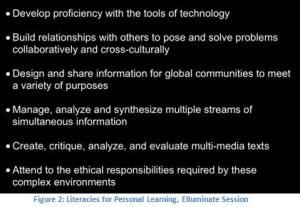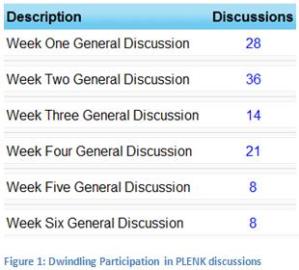 By Stefanie Panke
By Stefanie Panke
Editor, Social Software in Education
Lately, I’ve had a hard time keeping up with and documenting my attendance at PLENK2010, mainly because I missed several Web meetings and found it difficult to follow the discussion. Looking at the discussion forums, I sense that this is a common experience. Recurring reasons for passive participation or dropping out altogether are the lack of structure and the feeling that “it’s all been said.”
Dolors Capdet explained: “I think the vast majority of those registered do not know how to get involved in the course because they feel that they cannot bring anything new and, therefore, they assume the role of spectator” (MOOC discussion October 2010). Another participant complained: “When I responded to comments posted by fellow participants, the replies that I got back shut down dialogue rather than opened it up. I did not receive one response that made me want to reply to the same conversation again.” However, as a reply to this posting, Sheila received many hints, pointers and opportunities to debate.
Despite the dwindling participation, the past three weeks were arguably the most interesting part of the course, exploring the theoretical background for personal learning environments, sharing experiences in evaluating the learning process in a PLE, and trying to define digital literacies for learning with PLEs.
Theoretical Background for Personal Learning Environments
In week four, dedicated to the topic of learning theories, the discussion was picking up rather slowing down. George Siemens wondered: “Is it the topic or the period of the course?” Well, I’d say the introduction of the topic might have played a part. Here’s a quote from the facilitators: “At first glance, learning theory discussions have all the excitement of watching rocks break down into soil: the process is long and tedious and often seems to produce little value.” Despite the weary announcement, the readings pointed towards excellent resources, in particular the JISC eLearning models desk study by Terry Mayes and Sara de Freitas (2004).
There was a brief, controversial discussion about connectivism being the solution to gathering the various theories into one, articulating one set of general principles. I thought this was funny because adding one more concept to the landscape usually does not unify the flora. I personally do not conceptualize connectivism as an invasive species with the potential to wipe out all other theories and concepts of learning, but rather as a derivate of constructivist learning principles. Jane Wilde created a concept map that provides an excellent overview of different learning theories.
Evaluating personal learning environments
Week five dealt with the challenge of evaluating personal learning environments: “How do we measure what matters…and, to whom does what we measure matter?” (facilitators’ post). Again, the reading list provided interesting material, e.g. “A Guide to the Evaluation of E-Learning.” Stephen Downes proposed the idea of evaluation through recognition: “Learning is recognized, not measured – although we have taken to using tests and such as proxies for recognition, ultimately, we are not confident in saying that a person has learned unless someone who is already qualified in the field has observed and attested that the learning has been achieved.” Overall, the discussion was focused on definitions and concepts rather than evaluation techniques. I missed practical examples on how to make “experience the heart of all evaluation,” as John Dewey’s principles suggest.
Personal Learning Literacies
In week six, PLENK2010 focused on the skills needed to learn successfully within a personal learning environment. What does a learner need to function in an open, digital environment? The term “digital literacy” is central to this discussion. The facilitators define it in terms of requirements: “Literacy requires technical skills, conceptual mindsets, as well as an attitude of tolerance of complexity and ambiguity.” This week’s speaker in the Elluminate session was Will Richardson (http://weblogg-ed.com/), an expert on integrating social learning tools into schools, classrooms, and personal practice. “Too often, the tools become the center of attention,” he criticized, and offered seven strategies to make the most of personal learning networks: (1) Pursue Your Passion. (2) Read Widely – create diversity! (3) Filter. (4) Share. (5) Add Value. (6) Be Personal … Sometimes! (7) Manage and Balance.
 I particularly liked the advice to “manage and balance.” With the start of the semester in Germany, I am currently involved in teaching three classes. So, my next PLENK review might take a little while….
I particularly liked the advice to “manage and balance.” With the start of the semester in Germany, I am currently involved in teaching three classes. So, my next PLENK review might take a little while….
Filed under: Uncategorized |





 John Mark Walker: "If educational communities can continue to push platform integration and content portability, in the future, students may be able to design their own personalized degrees from smaller, modular chunks that cross institutional barriers" (
John Mark Walker: "If educational communities can continue to push platform integration and content portability, in the future, students may be able to design their own personalized degrees from smaller, modular chunks that cross institutional barriers" ( Richard Koubek
Richard Koubek
 Judith McDaniel
Judith McDaniel Tim Fraser-Bumatay: "Although the format leaves us far-removed physically, the online forum has its own sense of intimacy" (Judith McDaniel, "
Tim Fraser-Bumatay: "Although the format leaves us far-removed physically, the online forum has its own sense of intimacy" (Judith McDaniel, " Ryan Kelly: "For me to be able to work with people clear across the country for an extended period of time opened me up to new things" (Judith McDaniel, "
Ryan Kelly: "For me to be able to work with people clear across the country for an extended period of time opened me up to new things" (Judith McDaniel, " Daniel Herrera: "As a Mexican American, I know that words of identity are powerful; so to discuss white privilege with my professor and classmates in a face-to-face class would have been terrifying and impossible" (Judith McDaniel, "
Daniel Herrera: "As a Mexican American, I know that words of identity are powerful; so to discuss white privilege with my professor and classmates in a face-to-face class would have been terrifying and impossible" (Judith McDaniel, "












 Cathy Gunn: "Traditional methods for effecting change at my institution aren’t getting us even to a trickle yet, let alone to thinking about or planning for a wave!" (
Cathy Gunn: "Traditional methods for effecting change at my institution aren’t getting us even to a trickle yet, let alone to thinking about or planning for a wave!" (











Stefanie,
Thanks for the update. I confess to being a 2nd week drop out. I just felt that the discussions and everything were not going anywhere that I could follow.
[…] “Lately, I’ve had a hard time keeping up with and documenting my attendance at PLENK2010, mainly because I missed several Web meetings and found it difficult to follow the discussion. Looking at the discussion forums, I sense that this is a common experience. Recurring reasons for passive participation or dropping out altogether are the lack of structure and the feeling that “it’s all been said.” Stefanie Panke, Educational Technology & Change (ETC), 22. Oktober 2010 […]
[…] over Verfasst von Tim Schlotfeldt am So, 2010-10-31 09:10 Published inPLENK2010 1 Aufruf Like Stefanie I had a hard time keeping up with my attendance at PLENK2010. I have been really busy the last […]